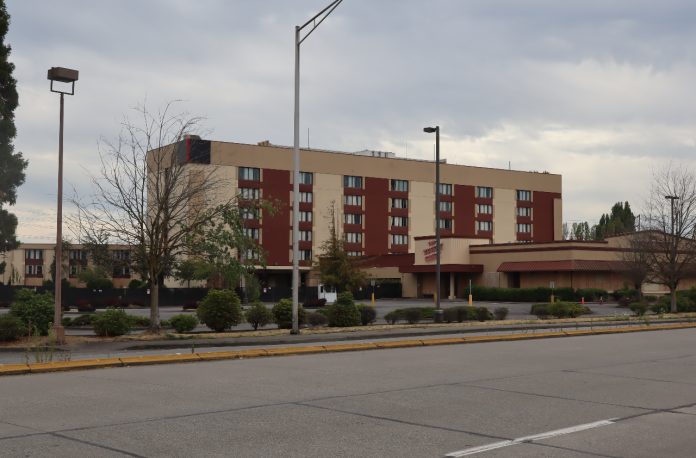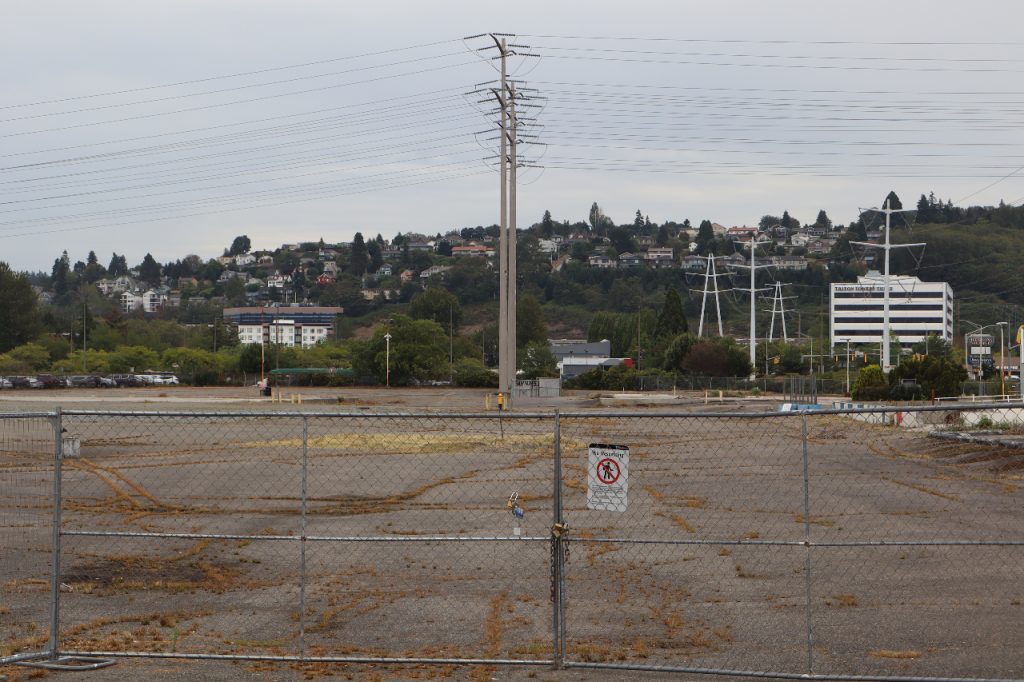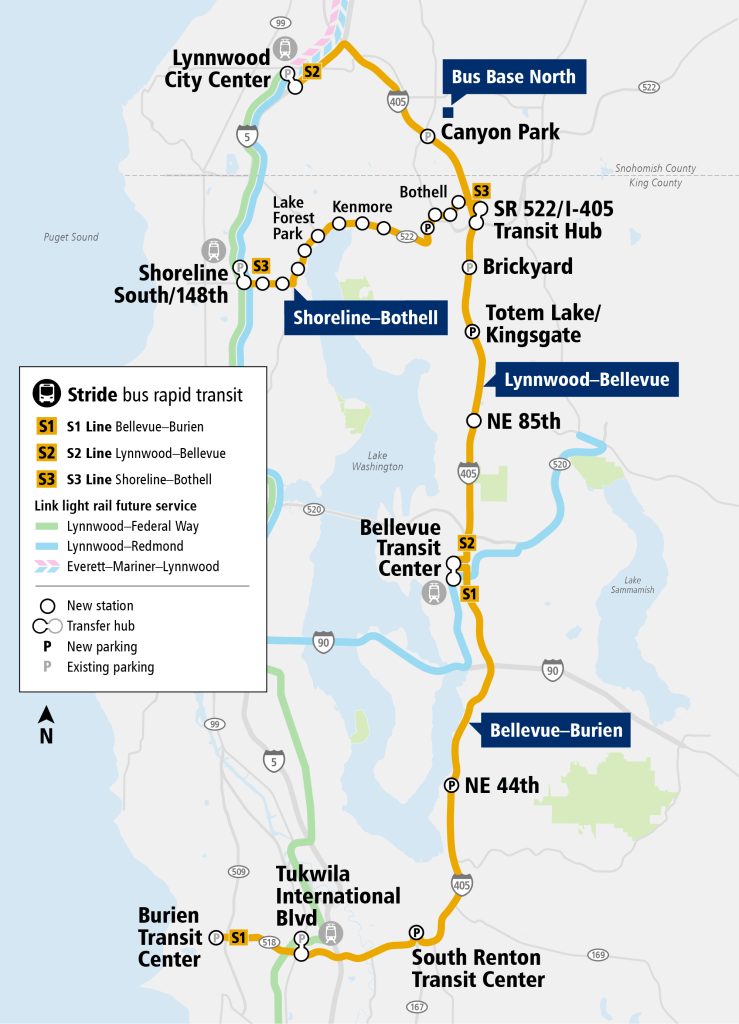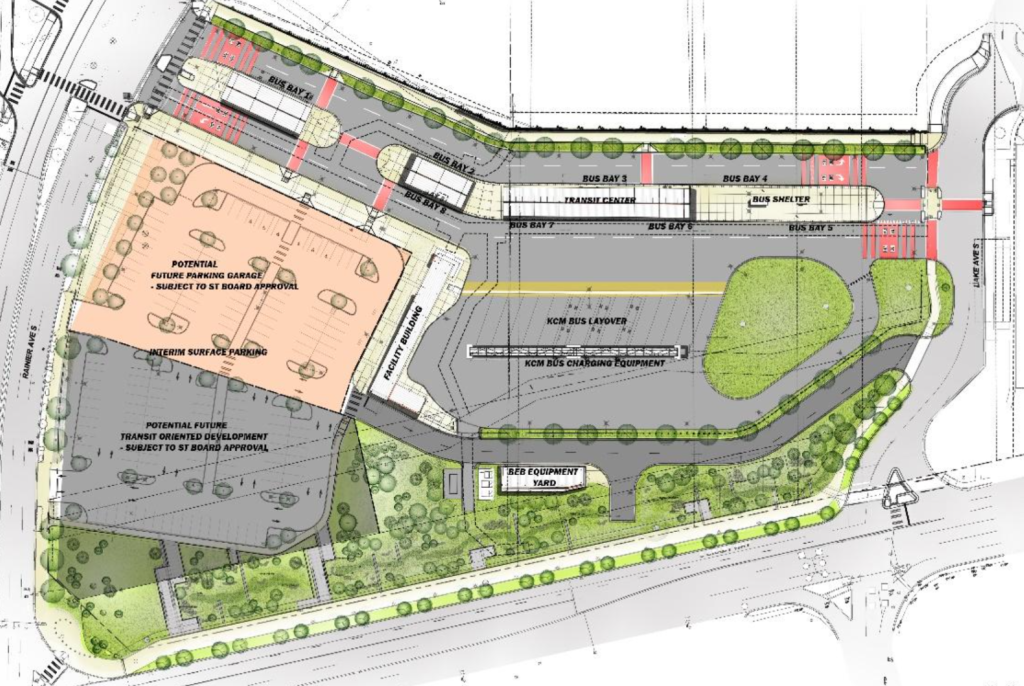
Moving a long-planned transit center near I-405 could cost Sound Transit $75 million.
The City of Renton has proposed a last-minute change to move the location of a long-planned Stride bus rapid transit (BRT) station and transit center in South Renton, internal Sound Transit documents obtained by The Urbanist show. The proposed new location, on the site of a former Red Lion Hotel that was purchased by King County earlier this year, would put the station closer to I-405, forcing riders to travel further and cross six-lane Grady Way to access most destinations elsewhere in Renton.
The current site of the future Stride station, formerly home to a Sound Ford auto dealership, was acquired by Sound Transit shortly after the approval of Sound Transit 3, and the agency has spent years remediating the site and demolishing the existing buildings, work that concluded in 2023. Construction had been set to start on building the station early next year, in anticipation of a 2028 start of service on the S1 line, which will run between Burien and Bellevue. In addition to off-street bus stops, the site plan includes layover space for King County Metro buses, and a planned transit-oriented affordable housing development. Moving forward with this could throw a wrench in those plans.

Two Sound Transit memos, dated this May and June and obtained by The Urbanist in a public records request, detail the implications that could come from the move, which so far has only been discussed behind closed doors. Overall, they paint a negative picture of such a last-minute change, which would have to be formally approved by the Sound Transit board to move forward. The Stride system has already been plagued by delays and cost increases, with the S1 line originally pledge as an early deliverable in 2024, later revised to open in 2026, before again facing delays.

The reasons for exploring the property swap are not fully clear. Officially, the City of Renton has cited a desire to explore a site for the transit center that doesn’t require buses to wait at the intersection of Rainier Avenue and Grady Way to enter and exit I-405. But such a move would delay the Stride S1 line by five years and cost Sound Transit at least $75 million, according to the memos.
The change also carries legal risk for Sound Transit, which acquired the Sound Ford site via condemnation. “There is still ongoing litigation associated with this particular acquisition and abandoning the current site would lead to potential short term and long term legal ramifications,” the memo notes.
The additional $75 million baseline in costs includes $15 million to $20 million for new environmental review and design, around $50 million that Sound Transit has already spent on the existing site, and the cost of five to seven years of delays on the Stride line.

Laura Pettitt, the City of Renton’s communications and engagement manager, told The Urbanist that the deal remains a hypothetical, but was initiated in hopes of speeding up buses using the future Stride line.
“This is an attempt at creative problem-solving. There’s no formal proposal on site-swapping, but this is one of several possibilities being explored,” Pettitt said in an email. “The idea originated after funding wasn’t secured for a BRT-only flyover. The flyover would have better connected Stride buses to the South Renton Transit Center and eliminated the need for these busses to wait in traffic at the Rainier Avenue / Grady Way intersection. After this, as part of a creative approach, the City looked into whether or not moving the transit center to the former Red Lion site (SE of the intersection and closer to 405), would save Stride BRT riders crucial transit time by avoiding the intersection altogether.”
Sound Transit’s updated environmental review for the transit center, completed just a few weeks ago, identified a bus-only, bus-on-shoulder lane between I-405 and an existing bus lane on Rainier Avenue S and future transit signal priority (TSP) at Rainier and Grady Way as ancillary improvements to speed up bus movement. While moving the station closer to I-405 could potentially reduce bus travel times even further, the proposed new station location would essentially be in a black hole for pedestrian and bike access.
At the Sound Ford site, Renton is planning multimodal improvements that would allow riders to access the station via S 7th Street, but there are no plans to improve Grady Way. The S1 Line will not serve Downtown Renton, so the station would move further outside the walkshed of many Renton residents.

The South Renton Stride station was originally set to come with a 752-stall parking garage, but construction on that facility was deferred to the mid 2030s by the Sound Transit board in 2022 due to increasing costs at the agency, along with several other parking projects. One of the memos details a potential partial property swap where the Red Lion site would only be home to the future parking garage, a move that would make riders parking at the station also cross Grady Way.
King County’s purchase of the former Red Lion for $36.2 million followed the county’s use of the facility as emergency shelter in 2020 and 2021, but the hotel currently sits vacant and its future use unclear. Another Renton hotel, the former Extended Stay America that the county purchased in 2021, is being turned into a 100-unit permanent supportive housing facility, but there were no signs that the Red Lion was heading toward the same fate.
Amy Enbysk, a spokesperson for County Executive Dow Constantine’s office, provided a statement that makes it clear that the county is holding the proposal at arm’s length right now.
“The City of Renton approached the county with their proposal and the Executive has since directed Sound Transit staff to analyze potential impacts including ridership, cost, and schedule, to determine its feasibility,” Enbysk told The Urbanist. “Concepts elevated by Board members and jurisdictions where Sound Transit will deliver service must be properly analyzed and vetted to allow Board members, agency leaders, and staff a full understanding of the impacts and trade-offs. Additionally, the Executive’s Office has encouraged direct meetings between the City and Sound Transit leaders to ensure thorough information sharing and mutual understanding of the factors the Board would need to consider if the proposal were formally evaluated.”
Meanwhile, Sound Transit says it is moving full steam ahead on the original site. “We are moving forward with the Stride S1 project as approved by the Sound Transit Board and expect to begin construction in 2025,” Sound Transit spokesperson Rachelle Cunningham said. “The S1 line, as approved, will yield significant regional mobility benefits and is the outcome of an extensive collaborative planning partnership with cities, King County Metro Transit and WSDOT. We share our partners’ interest in revitalizing the area around the future South Renton Transit Center and are committed to working with them to develop plans to achieve this objective.”
Ryan Packer has been writing for The Urbanist since 2015, and currently reports full-time as Contributing Editor. Their beats are transportation, land use, public space, traffic safety, and obscure community meetings. Packer has also reported for other regional outlets including BikePortland, Seattle Met, and PubliCola. They live in the Capitol Hill neighborhood of Seattle.

